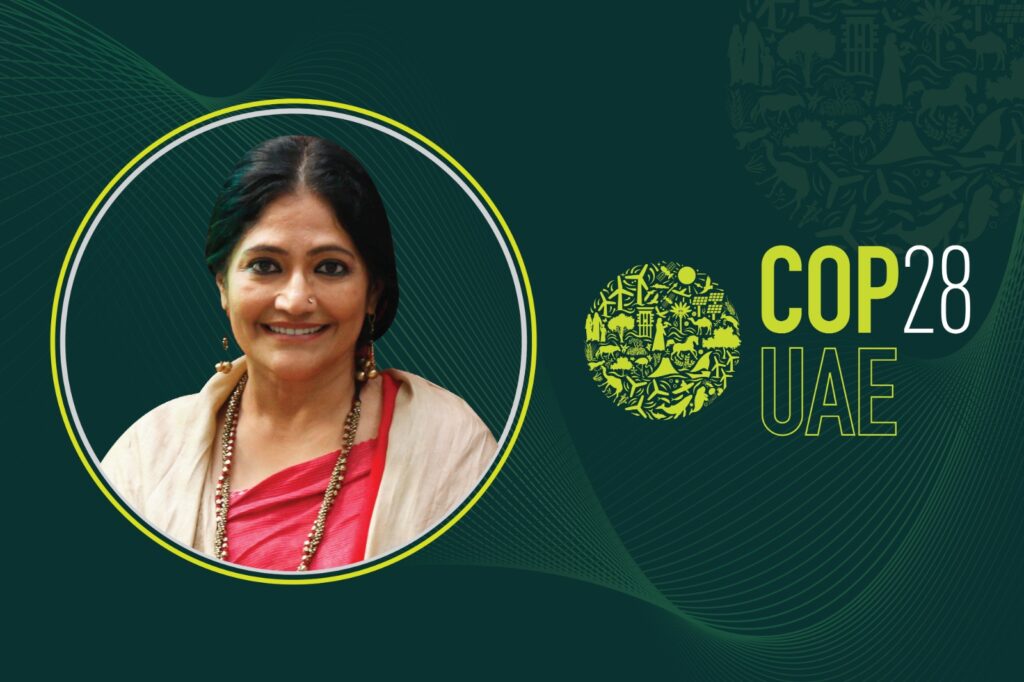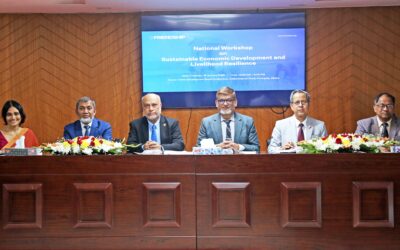Friendship’s founder, back from COP28 discusses what is needed from nations, organisations and individuals if we are to ensure a greener future.

by Runa Khan
January 4, 2024
As COP28 concluded in Dubai, we were presented with a complex picture of progress and challenges in our global climate efforts. After intense negotiations ran into overtime, many climate practitioners and activists were disappointed that world leaders managed to reach only such meagre concessions, such as the agreement to “transitioning away” from fossil fuels. The summit, split into two distinctive narratives, consisted of negotiations between state representatives alongside a more dynamic and hopeful sphere of side events outside the main conference areas.
The former determined the next global course of action, with individualistic limitations, while the latter drew goodwill, innovation, ideas, and common grounds. These discussions didn’t result directly in any policy changes or resolutions. But here, in the synergy between practitioners, academics, researchers, entrepreneurs, and policymakers who were truly committed towards sustainability, did I see real hope and encouragement even in the small concessions that the world leaders made at COP28.
Because these commitments provide opportunities to fundamentally change the relationship our economies have with energy, the climate and the world.
Small victories amidst vast challenges
At the COP28 negotiations, there were victories, but not to the extent needed amidst the backdrop of ever-increasing global temperatures. The USD 650 million pledged for loss and damage payments amounts to a tiny fraction of the $400 billion of loss and damage caused by climate change every year. And it doesn’t even register against the staggering USD 7 trillion spent on fossil fuel subsidies in 2022. This stark contrast isn’t just financial; it’s a profound injustice. The Bangladeshi poor spend 2 billion USD a year, out-of-pocket—double of the government and aid agencies put together—to recover from climatic disasters. We need an urgent paradigm shift to prioritise our planet’s health over short-term gains.
After days of heated negotiations over the semantics, all the countries finally agreed to “transition away” from fossil fuels. No specific targets were set, making the agreement even weaker than COP27, in which countries had already committed to “phase down” fossil fuels. The imbalance in the capabilities is quite evident, and the incentives between the global north and south to transition away from fossil fuels is more pronounced than ever. The global north, despite its resources, is lagging in this transition, while the global south struggles with a lack of necessary technology, policies, funds and incentives. This disparity underscores the need for a globally integrated, multi-stakeholder approach to climate action, where each entity, from governments to corporations, lobbyists and decision-makers, play a pivotal role.
Comprehensive transition beyond fossil fuels
Effective climate action goes beyond merely phasing out fossil fuels: it necessitates a holistic revamp of our economic and social frameworks. In alignment with articles 9 and 10 of the Paris Agreement, governments must craft policies that incentivise sustainable transitions and technology transfers. Corporations, in turn, should shoulder their social responsibilities by incorporating long-term, geography-sensitive, and context-specific solutions into their operational ethos. This approach should synergise with ongoing research and tangible examples. Moving beyond the mere deployment of green technologies, we must ensure these systems are sustainable, accessible, and genuinely beneficial at the grassroots level. Responsibility must resonate through every layer of society, shifting focus from sporadic projects to meaningful, long-term adaptations.
Shifting to renewable energy sources is merely the initial step of a sustainable infrastructure. Our journey towards renewables like solar, wind, and biogas must involve reducing production costs and emphasising lifecycle sustainability. Solar power grid batteries should be managed and disposed of with utmost care to prevent environmental contamination, while wind power plants need to be designed to withstand disasters and safeguard wildlife. Understanding the eventual fate of these technologies is crucial.
Context-specific solutions taking into account local circumstances need to be at the forefront of climate actions. The transition must thus be accompanied by robust training programs and ensure equitable technology distribution so that communities are equipped to maintain and innovate upon these technologies. This approach not only empowers communities but also fosters the development of ancillary industries, and creating a ripple effect of economic and social benefits.
A multifaceted approach to climate adaptation at COP28
In parallel with the discussions on global stocktake and compensation for loss and damage, the side events were in full swing—a melting pot of synergy and exchange!
Conversations and collaborations extended beyond energy to encompass broader environmental issues. These ranged from ecosystem restoration, water management, and agricultural sustainability to the interlinkage of climate change with global health systems and economics. The discussions also covered the legal mechanisms of the Paris Agreement, ethical considerations in climate interventions, and the potential of nature-based solutions. Participants recognised the interconnectedness of these issues with climate change, emphasising the need for solutions that address ecological balance.
From the proliferation of waterborne diseases due to floods to salinisation, the link between health and climate stood prominently at the fore. It’s essential to devise climate-adaptive health solutions. This year’s COP marked a significant milestone with its first ever thematic day dedicated to health, along with the introduction of the inaugural Climate and Health Declaration, officially recognising health as a crucial facet of the climate crisis. 22 years ago when we first began work with climate migrants at Friendship, we identified that unless high-quality, essential health services were provided to climate victims it would be impossible to restart their lives. This time at the COP summit, the world too recognised the link.
Side events also uncovered the potential for ecological and economic value in adaptation solutions. With sea levels on the rise, initiatives like mangrove plantation and embankment maintenance were highlighted as critical in protecting coastal communities from the impacts of climate change. The trade-offs too were brought to the fore, highlighting how mangrove afforestation requires different modalities in Bangladesh, where every inch of space is economically vital for the preservation of the enormous population, as opposed to Brazil where coastal land is relatively abundant. Yet, we have a hugely successful mangrove afforestation programme that not only protects habitats from cyclones and tidal surges, but also creates jobs and economic value for the community.
Amidst these discussions, the pressing issue of climate migration was also underscored as a critical aspect of climate adaptation strategies. As habitats become increasingly unliveable, communities are compelled to relocate, often with scant resources or support. This presents a complex socioeconomic challenge, necessitating comprehensive strategies that integrate environmental sustainability, human rights, and community resilience. These strategies must also be nuanced and multi-faceted, to manage the delicate balance between ecological imperatives and human needs.
The point I have strongly tried to make this year is that climate-impacted countries like Bangladesh, and the communities here deserve respect as innovators and knowledgeable players in climate adaptation. They need support, yes, but are capable of implementing long-term locally-led solutions which have far deeper and wider impact. There is no need to go around piloting prefabricated, imported solutions. Often, such pilots look great on paper but are much less useful on the ground. Too many resources are expended on this pilotitis. We need to create, empower and explore local solutions and local knowledge using real expertise.
The mainstreaming of climate action though, always needs to come centrally from the individual governments. All state services and infrastructure have to be harmonised with the national adaptation plans and the country’s environmental policies. Bangladesh has been a leader in adaptation and also showed leadership in this harmonisation between its climate policies and the work of all its ministries at various levels of government. The world needs to acknowledge that.
The side events at COP28 were crucial platforms for sharing knowledge, experiences, and best practices. These gatherings, often informal, fostered an environment where innovation, goodwill, friendship and practical solutions converged, highlighting the power of collective action in addressing climate change.
Voices of the climate-affected
At COP28, the side events served as a critical forum, bringing forward the ‘real people’ who experienced the impact of climate not once but over and over again throughout their lives. At COP21, Friendship had presented adaptation solutions instead of the then-hyped mitigation. At COP26 Friendship presented direct voices from the field, through live video with people at the front line. It was a vital glimpse of the pain, suffering and the devastation faced by communities.
This time, Biuti and Ronzina, two Friendship school students from the chars of the Brahmaputra, joined the Friendship Delegation and presented their voices at COP28. Their first-hand accounts provided a poignant glimpse into the impact of climate change. Their presence, along with youth from around the world, created a powerful sense of solidarity. This year, the collective voice from the youth pavilion was clear and resolute: they demand to be heard and included in the decision-making process.
We must pay heed, for they stand as representatives of two pivotal groups—the youth and those directly impacted by climate change—whose perspectives are essential in shaping the policies and negotiations, but are often overlooked or underestimated. They are the future stewards of our planet, destined to live with the repercussions of decisions made today by leaders who often bypass them in the corridors of COP. Their voices aren’t just pleas; they’re the clarion calls for a sustainable and inclusive future we must all strive to achieve.
In anticipation of a greener future
Truth be told, even the weakest commitments coming out of COP28 are a glimmer of hope, no matter how faint. The voices of truth are ignored by the temporary leaders who make decisions about their lives. Those leaders will come and go, but the Biutis and Rozinas will continue their presence for many more COPs.
The side events at COP have become a global pilgrimage for those working towards a greener future, tackling the multifaceted aspects of climate change. COP28 has laid bare the challenges and opportunities in our path towards a sustainable future. As we reflect on the discussions and insights from the summit, it is clear that the journey ahead is not just about transitioning from one energy source to another but about fundamentally reimagining our relationship with the planet, our love and respect for all who share our planet.
It’s about providing dignity and opportunity to those most affected, about turning our pledges into actions, and about ensuring that every step we take towards sustainability is one that uplifts communities and preserves our planet for future generations.
At Friendship, we remain committed to these ideals, working tirelessly to ensure that every effort, big or small, contributes to a greener, more sustainable future for all.



